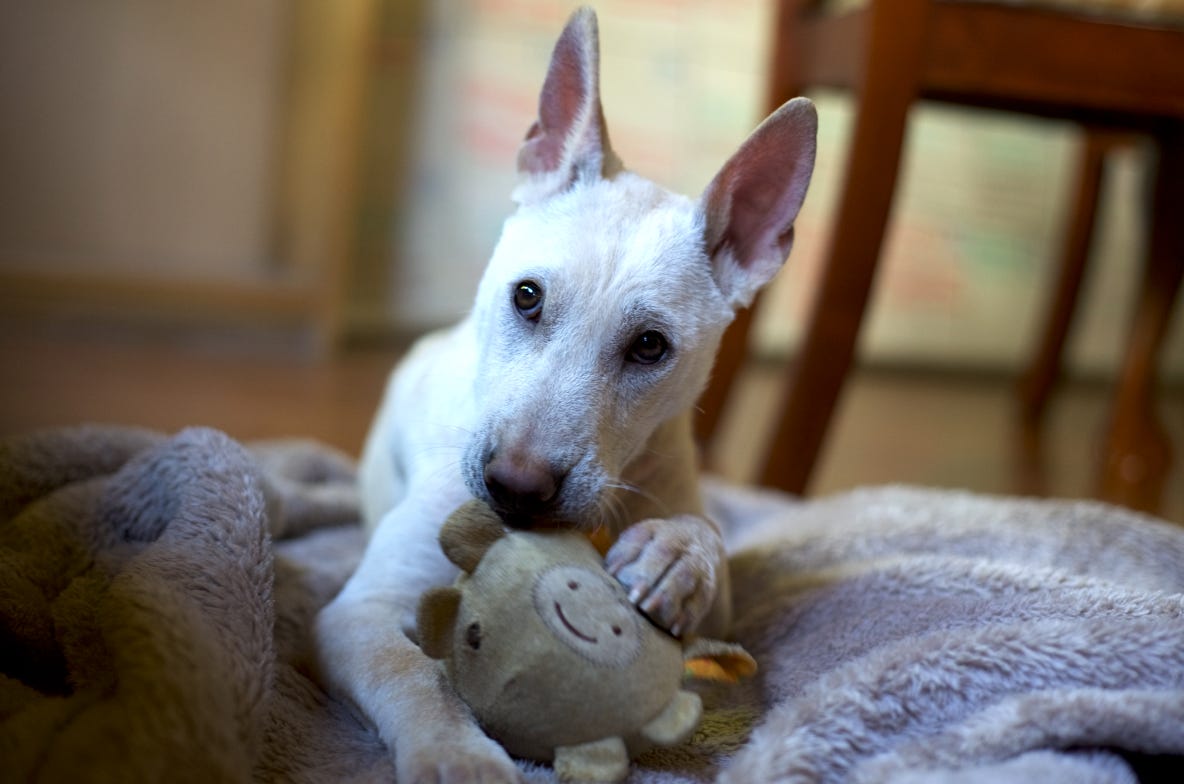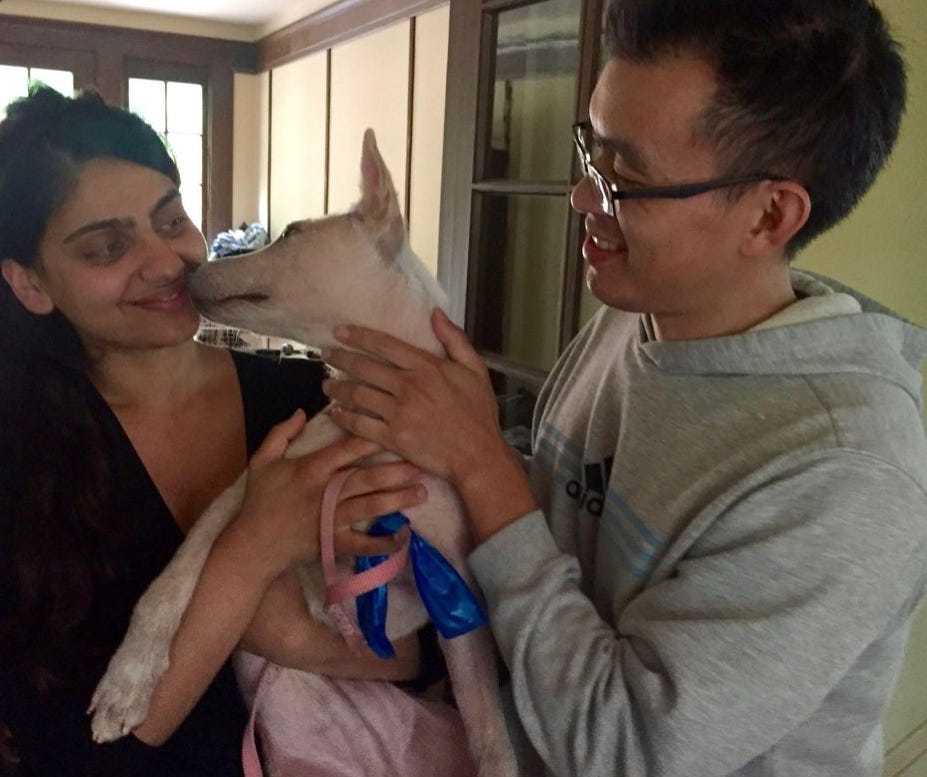The Hardest Phone Call of My Life (Podcast)
When this blog and podcast are published, I’ll be in the middle of a criminal trial that could change my life forever. Many of you have asked what you can do to support. I thought I’d share a story about one supporter who quite possibly saved me from prison: Priya Sawhney. Her story shows what you can do to have a similar impact, not just on this case, but on the world. It’s a story of the power of compassion, and it shows why, no matter what happens at trial, those who believe in compassion will prevail – and change the world.
But the story doesn’t begin there. It begins in despair.
On Dec 2, 2021, I had one of the hardest calls of my life. I was facing my first felony trial, in a case involving the first open rescue that we had broadcast live in DxE history. And things were looking bad. The judge had cut off my opening statement, mid sentence, when I began talking about the medical care we had given the sick baby goat at issue in the trial. And the court had prevented the jury from hearing the whole story – including the extensive efforts caretakers had to make, including the use of powerful “second-line” antibiotics, to rescue baby goats who were malnourished, sick, and/or covered in lice. As far as this jury knew, I had barged into a farm for no good reason and stolen someone’s baby goat.
The goat rescue that led to my first felony conviction was shown live on Facebook, in an effort to demonstrate our commitment to transparency.
I called Priya, at the close of evidence, and told her this might be the last time I talked to her or our furry kids – Joan the cat and Oliver the dog – who we have co-parented for many years.
“Wait, what?” she said.
“I think the odds are that I’m convicted, and the prosecution has said they’re looking for ‘serious consequences.’ “
“They can’t! You were just saving a poor baby goat.”
“That’s not what the court heard. And I think we have to be prepared for me to go away for a while.”
We both started crying, and she turned the camera toward our dog Oliver, who looked at the camera with great alarm. Normally, when he hears my voice, even via phone, his ears perk up and he begins wagging his tail. But this time, whether because he heard the despair in my voice, or the pain in Priya’s, his ears pulled back against his head, and he seemed scared by my voice. He sensed my resignation, perhaps even despair. He didn’t know what was wrong. He just knew that his dad was gone, and that his mom was afraid.
Priya spent the last few minutes of our call updating me on Oliver and our other furry kid Joan. I got to see their eyes – the beautiful eyes I cherish more than any others in the world – one last time. Then I got back to prepping for my closing statement. Those closing words, I thought, would determine my fate.

But I was wrong. You see, Priya had words to share, too. And while she could not argue for me at trial, and in fact, was thousands of miles away in Berkeley while I prepared my closing statement in Transylvania County, North Carolina, she could still share those words with the world. She posted a livestream, in which she was weeping openly, asking the world how it could punish someone for rescuing a baby goat from death. It was a prayer for freedom. A prayer for understanding. A prayer, first and foremost, for compassion in a world filled with violence and death.
And something amazing happened. It worked. The next day, when I came into court, the prosecutor on the case, who in the first days of trial had nearly come into a physical confrontation with me, pulled me aside behind the courtroom.
“Wayne, I’ve seen some of your supporters really hurting. And I just want to let you know, that if we get a conviction, we are not going to be asking for prison time.”
I was stunned.
“I don’t….,” I stumbled. I was at a loss for words.
“Some of the folks on social media we’re seeing, I know it’s hard. Pass it along.”
“This is… I don’t know what to say. Thank you for your compassion. It means so much.”
The prosecutor didn’t tell me what, if any videos, he had seen. And there had been other people showing emotion in the days near the close of trial, both in person and on social media. But I felt sure that Priya’s video was one of them. And what he saw, well, it very well may have transformed his views of the case.
I thought this story would be a good one to tell now because it informs how I think we can approach, not just the next week, but the difficult moment we are all in. I’ve written about the epidemic of suicide and loneliness our society is facing, and about the conflicts and distrust that threaten to tear our civilization and species apart. The trial I am facing is, in a sense, a metaphor for the trial we are all facing: it’s a trial over the future of the human species.
And there are things about Priya’s video that I think we can all learn to ensure that, in this trial, we prevail. Things that made it powerful to the prosecutor, and to me, when I watch it again.
And that starts with authenticity. The video is far from perfect. Priya stumbles with her words, and she expresses anger that, to be honest, makes me a little uncomfortable at times. But there’s no doubt that her words come from the heart. This is crucial for anyone hoping to create change.
If you are writing to your friends, family, or on social media, about this trial, this should be the first lesson of how to do it correctly: speak from the heart. Too often, we try to package and perform and propagandize our way to success. But in a world that is increasingly virtual, it’s becoming even more powerful to be real. So the first rule of talking about this trial, or any other tense or controversial situation, is to just speak from the heart.
The second key part of Priya’s words, however, are that they focus on systems and not individuals. There are angry words, for sure, about the decisions made by the judge in the North Carolina trial. But Priya understands that all of these decisions are made in the context of a broader system. There are forces – a tyrannical bureaucracy, a political system driven entirely by profit – that are shaping individual behaviors. This is crucial to anyone who wants to create change.
Among the most important concepts in social science is what is called the Fundamental Attribution Error. It comes in many flavors, but in essence, the error is this: too often, when we see some mistake in others, we attribute it to the inherent qualities of the person, rather than the system around them. It turns out this is very often – overwhelmingly often, I would argue – a mistake. Especially in a social species, we tend to do what the culture around us tells us to do.
This is true even of atrocities. The great philosopher Hannah Arendt wrote about the banality of evil: how ordinary people can be convinced to support mass murder through the “expectations” of the systems around them. The prison guard at a concentration camp. The soldier in a foreign village. Or the worker at a factory farm. In all these cases, the problem is not the inherent moral quality of the individuals but the corruption of the system. Priya recognizes this in her video, and it not only allows her to properly diagnose the problem – but it gives individuals who are part of the system the space to break free.
The most important part of Priya’s words, however, are that they are grounded in compassion. Those who are trying to create change are often animated by strong negative emotions. Anger. Outrage. Distrust of systems that have been corrupted. But those who are effective are always grounded in something warmer, and even welcoming: the power of compassion and love. Even when Priya is condemning the system for its abuse of vulnerable creatures, or its denial of my basic constitutional rights, it’s clear from her words that, at root, even her strongest negative feelings are motivated by love.
Love of the animals. Love of her friend and co-parent. Love of a world where all beings are free.
The great sociologist Doug McAdam has written about how there are two ingredients to change: anger and hope. I would add an addendum to this theory: that hope can only come from love. Because of all the things we might hope for, of all the things we envision when we dream of a better life, perhaps the most important is a life filled with love. All human beings understand this, and so when we see someone motivated by love, even if their demands seem alien and strange – dangerous, even – we still can’t help but sympathize.
That’s what happened with the prosecutor in my case in North Carolina. And it’s what will happen to us in Utah, and beyond, so long as we make our love for other beings – compassion – the foundation of everything we do.
I hope you’ll join me in doing that this week.
—
As I mentioned at the beginning of this blog, this could be the last time you hear my voice on the podcast in a while, as it’s possible that the trial will be over by the end of the week. While we are very uncertain as to what might happen, if that is the case, we know that the fight this week is an uphill battle. Numerous rulings in court will make it difficult – perhaps impossible – for us to mount an effective defense.
But the podcast will go on. Priya has committed to taking on the reins, if I’m no longer available next week. We’ll probably keep the name, and Priya will pass along stories about what’s happening with Paul and I in prison. And my hope is that, as before, we’ll be able to learn together from the struggles we work to overcome.



Great conversation and blog. #TheSimpleHeart #TheSanctuaryInitiative #EverybodyWayneHsiungTonight #SmithfieldTrial #RightToRescue
So touching and beautiful Wayne. With you in spirit, we have hope (and love). Margaux